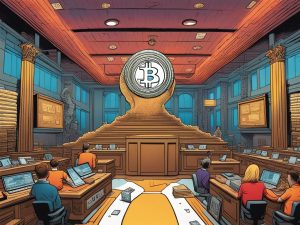U.S. Representative Warren Davidson: CBDCs ‘Corrupt Money’
In a recent statement, U.S. Representative Warren Davidson from Ohio and a member of the House Committee on Financial Services expressed his strong opposition to central bank digital currencies (CBDCs) and the potential issuance of a digital dollar in the United States. Davidson believes that CBDCs corrupt money and can be used as a tool for coercion and control. He reassured readers that implementing a CBDC in America would require legislative approval, and a bipartisan coalition in Congress is actively working to ban CBDC development.
The Move to Avoid a Digital Dollar in America
Davidson is not alone in his concerns. Congressman Alex Mooney introduced the Digital Dollar Pilot Prevention Act in May to prevent the Federal Reserve from establishing a CBDC testing program. The upcoming launch of Fednow, a payments system for banks and credit unions, has raised worries about its connection to the digitalization of the U.S. dollar. However, the Federal Reserve has denied any plans to eliminate cash or introduce a CBDC. Economist Jim Rickards has also warned about the potential negative effects of a Fed-issued CBDC, likening it to China’s social credit system. Presidential Candidate John F. Kennedy Jr. has expressed similar concerns about a CBDC tied to digital IDs and social credit scores.
Key Points:
- Warren Davidson opposes CBDCs and the digitalization of the U.S. dollar.
- Legislative approval is required to implement a CBDC in America.
- A bipartisan coalition in Congress is actively working to ban CBDC development.
- Congressman Alex Mooney introduced the Digital Dollar Pilot Prevention Act to prevent CBDC testing.
- The Federal Reserve denies plans to eliminate cash or introduce a CBDC.
Hot Take:
While some see the digitalization of the U.S. dollar as a step towards progress, Warren Davidson and others believe it poses serious risks. They argue that CBDCs could be used as tools for control and coercion, potentially leading to government surveillance and restrictions on financial freedom. As the debate continues, it remains to be seen whether CBDCs will gain traction or if legislative efforts to ban their development will prevail.


 By
By
 By
By
 By
By
 By
By
 By
By
 By
By